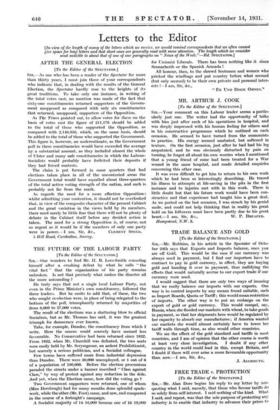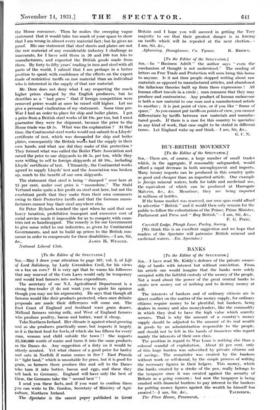FREE TRADE v. PROTECTION
[To the Editor of the SPECTATOR.] Sm,—Mr. Alan Dore begins his reply to my letter by mis- quoting what I said, namely, that those who favour tariffs do so solely from self-interest. I said nothing of the kind. What I said, and repeat, was that the sole purpose of protecting any industry is to enable that industry to advance their prices to
the Home consumer. Then he makes the .sweeping vague statement that it would take too much of your space to show that I am wrong in almost every material fact; but he gives no proof. His one statement that steel sheets and plates are not the raw material of any considerable industry I challenge as inaccurate, for I have sold them in 50 and 100 ton lots to manufacturers, and exported the British goods made from them. By forty to fifty years' trading in iron and steel with all parts of the world, I submit. that I am perhaps in a better position to speak with confidence of the effects on the export .trade of restrictive tariffs on raw material than an individual who is interested in the supply of that raw material.
Mr. Dore does not deny what I say respecting the much higher prices charged by the English producers, but he describes as a " bad guess " that if foreign competition were removed prices would at once be raised still higher. Let me give a personal vindication of my statement. Some time pre- War I had an order to place for ship and boiler plates. I got a price from a British steel works of E6 10s. per ton, but I must guarantee they were for shipment, because the price to the. Home _trade was f„8.5s. What was the explanation ? At that time, the Continental steel works would not submit to a Lloyds' certificate of test, which was demanded for ship and boiler plates, consequently the British worts had the supply in their own hands, and what use did they make of this protection ? They formed what was called the Boiler Plate Association and raised the price to our shipyards to £8 5s. per ton, while they were willing to sell to foreign shipyards at £6 10s., including Lloyds' certificate of test. Ultimately, the Continental works agreed to supply Lloyds' test and the Association was broken up, much to the benefit of our own shipyards.
The statement that steel is being dumped " over here at 25 per cent. under cost price is " moonshine." The Stahl Verb-and make quite a fair profit on steel sent here, but not the exorbitant profit that they make from their own consumers owing to their Protective tariffs and that the German manu- facturers cannot buy their steel anywhere else.
Sir Peter Rylands touched the spot when he said that our heavy taxation, prohibitive transport and excessive cost of social service made it impossible for us to compete with coun- tries not so handicapped. The remedy is-for our Government to give some relief to our industries, as given by Continental Governments, and not to build up prices to the British con- sumer in order to compensate for these disabilities.—I am, Sir,



































 Previous page
Previous page